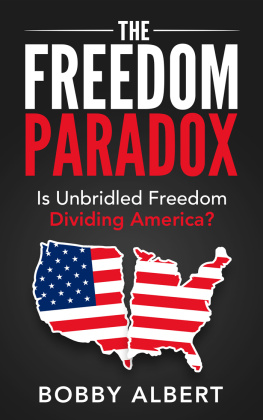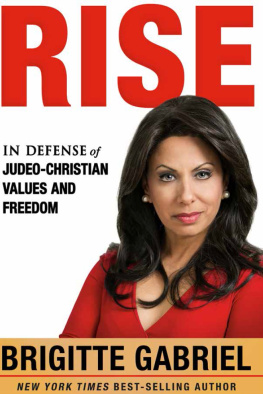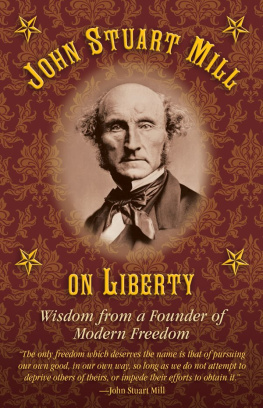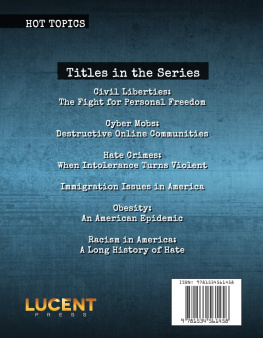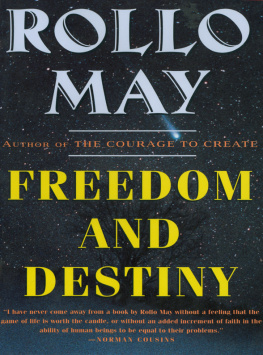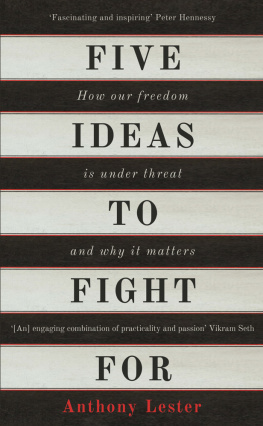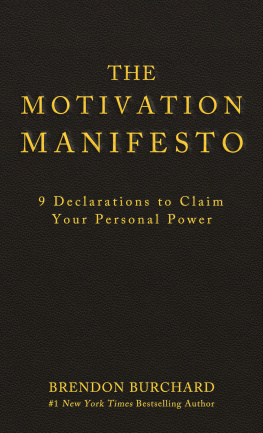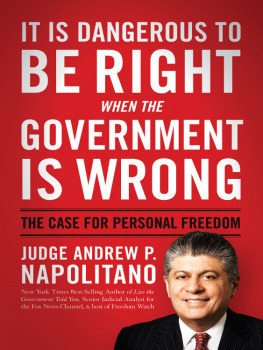For Lio.
His future.
His freedom.
Freedom was an ideology that was common into the st century, according to which every human being was supposed to be free to choose between different options.
Page Freedom
in: Googlepedia, The Encyclopedia.
Processing status: 21.02.2120, 23:55 UTC
Introduction
In the digital age, its easy to get swept up in online shopping, Facebook, Netflix, Wikipedia, online gaming, Twitter, and more. We feel free, as though we can arrange everything exactly as we like.
Or thats what were led to believe. Were relentlessly driven by technology, breathlessly checking our pulse on our smartwatches, plowing through hotel reviews, snapping up our smartphones at every vibration, losing ourselves in a maelstrom of YouTube videos.
There is method to this madness and this method comes with a snag. And this snag will drag away our liberty.
Unless we act now, our lives will soon be determined by algorithms, rather than our own choices. But technology itself is not the problem: Its corporations that reduce us to mere metrics and manipulate us. Its the right-wing populists who lie to us and intimidate us. Its the State that monitors us and presumes us guilty until proven otherwise. They all put us under their yoke and, in return, satisfy our thirst for fun, for resentment, and for security. Its a very soft yokeso soft, in fact, that we barely feel itand all the while, it robs us of our agency.
But we can still stop the high priests of the algorithm from plunging humanity into a new Middle Ages, where the individual is once more subordinatednot to religion this time, but to superior machines.
To prevent this, we must () understand how our heedless pursuit of convenience leads us to sacrifice our freedom and dignity. We must () remember how precious that freedom is. And we must () find ways to salvage our freedom without necessarily relinquishing the benefits of digitization.
Yes, it is possible. We can build a digital future in which we live free, self-determined, and dignified lives. And we already have the tools we need, both politically and in our individual actions.
Our Liberties are Threatened More than Ever Before!
For most of human history, the dominating forces impacting society were hunger, disease, war, and natural disasters. Gods and princes determined a communitys identity. But a few centuries ago, people decided to take their fate in their own hands. The American Revolution, followed by a century-and-a-half of revolutions from France to Latin America to Russia broke the fetters of religion and monarchical rule, replacing them with the tenets of the Enlightenment and reason and the rule of the people. Above all, however, these shifts in authority placed the individual at the center of our thinking. Henceforth wenot any higher powerswere in charge of our lives.
The bourgeoisie and a scientific curiosity freed from ecclesiastical dogmas brought us three more industrial revolutions: mechanization, mass production, and information technology. Each of these developments caused major upheavals and, ultimately, rearranged the balance of power. Intellect displaced brute power. Machines displaced human labor. Industrialists displaced the nobility. Intellectual property displaced material property. Now, with digitization, we are already in the throes of the fourth industrial revolution.
Everything that you can now imagine is being converted into digital formats and networked. At home, in the car, in the office, in science, culture, and the media, digitization promises us a healthier life, safer and more comfortable transportation, more security, and, provided we behave ourselves, perhaps even an unconditional basic income.
But in solving old problems, our technology all too often creates new ones. Its greatest victim so far is the climateand its next victim could be our freedom. We are told that to make our dreams come true, we too must be digitized. The databases of states and corporations create our digital alter egos, and we do not have the right to decide about our inclusion in them.
At the moment, no indicator lights up when our adrenaline levels are too high, nor does a signal warn our surroundings if we are in a bad mood. Even so, our many interactions within the digital world are being recorded, stored, analyzed, and used.
This makes us vulnerable. An entire industry thrives on predicting our behavior and seducing us. Everyone knows its most powerful players: Google, Facebook, Amazon. Theyve learned to extract gold from colossal data repositories. Artificial intelligence (A.I.) is their finest sieve. A.I. helps them collect even more data by capturing our attention through recommendations for more videos and news. Third parties increasingly know how to exploit this targeting for themselves. The most shameless of these is a resurgent right-wing populism, which uses Facebook, Twitter, etc. better than anyone to promote its rhetoric. Instead of preventing this, the State is, itself, busy measuring and prejudging us in the name of security. Everybody is recorded and categorized, increasingly often by algorithms.
Current law does not sufficiently confront these dangers to our freedom in our daily actions and thoughts. That is why, despite all the wonder at the marvels of new technologies, we must fear for our freedom as capitalism, right-wing populism, and the security state squeeze it in a powerful digital vise. Only the most flexible, transparent people will do well under this treatment.
Fundamental Rights Safeguard Our Freedom, but Not from Manipulation
For a long time, freedom was only for the elites, tribal leaders, priests and princes, plantation owners, and industrialists. It took a long time to abolish slavery and serfdom and introduce the rule of law and fundamental rights, and this transformation has still not been achieved everywhere. Nevertheless, more people are free today than ever beforenot free to do whatever they want, but free from being subject to the will of others. Thanks to this individual freedom, we can openly articulate and assert our interests. We can be who we are, say what we think, believe and love what and whoever we want. We can see, read, and listen to what we like.
This individualized freedom is protected by our civil rights, which are the first and best line of defense against the State. The State must not take our lives or injure us. It must not restrict our religious practices or forbid us to speak. It must not touch our property or restrict our choices of professionunless there is a good reason for doing so, and the infringement on our rights is proportional to the advantages to society as a whole. Moreover, the State is obliged to protect us from any violation of our fundamental rights by private individuals and companies. Thats why the police are required to intervene if someone attacks us. And thats why the State cannot leave the operation of dangerous technology, such as nuclear power plants, to private companies without formulating specific rules for operating them safely.
These fundamental rights are enshrined in national constitutions, such as the Bill of Rights, the first ten amendments to the U.S. Constitution, or the German Basic Law, and many international treaties. Thanks to the right to adequate legal protection and representation, we can sue in national courts up to the German Federal Constitutional Court, the U.S. Supreme Court, or the European Court of Human Rights in Strasbourg and the Court of Justice of the European Union in Luxembourg.
All this is only meaningful because the wielders of physical state powerthe public administration, the police, the militaryrespect our rights and the judgments of the courts.
The prerequisite for exercising our rights is that we are free in another sense. Respect for civil liberties is a necessary, but not a sufficient condition for true freedom. According to the philosopher Hannah Arendt, we must also have the freedom to be free, which requires freedom from want.
Next page

